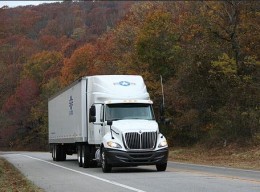Trucking No Longer a “Ticket To The Middle Class”

It’s a few minutes into a run carrying a load of scrap copper from the Port of New Jersey to a waste transfer station outside Philadelphia, and Miguel Tigre reaches over the dash of his maroon-and-yellow cab to grab a folder stuffed with the receipts squeezing him dry. He reels off calculations: He gets paid $400. It’s about 150 miles round-trip, and his truck gets 5.2 miles per gallon, so that’s $180 in fuel. Tolls are $20. Taxes take about a quarter off the top — but then there’s insurance for the truck, and any repairs, which came to $22,000 last year.
All told, that amounts to $32,000 in take-home pay per year, which is barely enough to cover rent and food for him and his wife, who doesn’t work. Then there’s child support and car insurance. Tigre, a stocky 56-year-old with the paunch that comes from sitting for 12 hours a day, says he can’t afford health insurance — he’s diabetic, and pays $100 a pop out of pocket for regular doctor’s visits, plus $300 a month for insulin. And retirement? Tigre laughs, harshly.
This piece on The Washington Post’s Wonkblog has now taught me basically everything I know about truck driving, which before reading it was uh, not much! Reporter Lydia DePellis talks to a few different truck drivers about the effects of a diminished labor union, rising toll prices and diesel fuel costs, and the vast increase of truck “owner-operators” who are essentially independent contractors and receive no benefits.
“The conditions that these guys work under is like sharecropping,” says Potter. “The trucking company tells them what crops they can plant, what fertilizer they can use, makes them pay for all their equipment, and then tells them, you’re independent.”
Photo via Wikimedia Commons
Support The Billfold
The Billfold continues to exist thanks to support from our readers. Help us continue to do our work by making a monthly pledge on Patreon or a one-time-only contribution through PayPal.
Comments